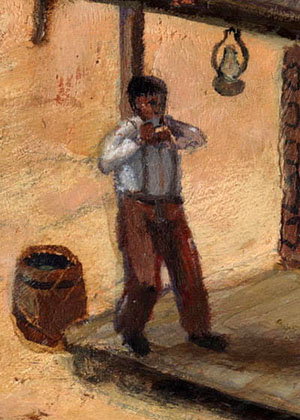
Twelve-year-old Henry Williams spent most evenings on the porch standing under the lantern and filling the air with music—or at least noise! Sometimes, even the crickets and frogs would stop their chirping and croaking, perhaps wondering what the strange racket was. He still sounds pretty “squeaky” on his new harmonica, but he’s practicing every chance he gets. Perhaps he is learning old folk tunes, such as “Turkey in the Straw” and “Old Dan Tucker”, from his father. Or maybe it was some of the soulful spiritual music he heard in church every Sunday.
People have always enjoyed making music to entertain, express their feelings or just pass the time. Musical instruments were often made by the user from materials available nearby. Remnants of two musical instruments – the harmonica and the Jew’s harp – were found at the Ransom Williams’ homestead. These instruments were machine-made and the harmonica was probably imported from Germany.
So we know that Ransom Williams, just a decade or so into his life as a free man, was able to purchase foreign-made goods, including items that were luxuries, not necessities. He was able to provide his family with more than just their basic needs!
See what the archeologists found!
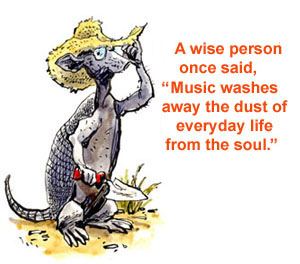
There was some lively music played at the Williams farm, based on the evidence found by archeologists. We can imagine the family sitting on the front porch singing along to tunes played on the harmonica, punctuated by the odd-sounding "boing" sounds of the jaw harp. Although we do not know who the musicians were in the Williams family, they used up about a dozen harmonicas!
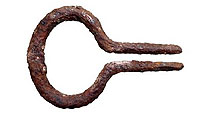
Listen:
One complete harmonica and 11 pieces of harmonicas were found at the farm along with a jaw harp. The complete harmonica has brass side plates that are stamped with the words, "The Nightingale," on one side and "[G]olden Richter" on the other.
Harmonicas and jaw harps were common musical instruments in the nineteenth century. The jaw harp, also known as the Jew's harp, mouth harp or juice harp, is one of the oldest musical instruments in the world. It originated in Asia, but versions of this instrument can be found in cultures all over the world. This key-shaped instrument has a flexible reed attached to a rigid frame that the player puts in his/her mouth and plucks to make the sound. Learning how to play it is not difficult once you get the hang of it.

The harmonica, also known as the mouth organ and the French harp, was invented in Austria in the 1820's and brought to America by German immigrants. By the 1860's, Matthias Hohner, a German clockmaker, had figured out a way to mass-produce harmonicas and started to develop different types. The instrument, first intended for classical music, became popular in American folk and country music and jazz.
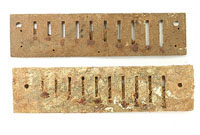
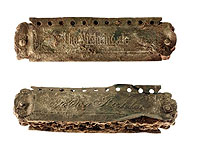
Harmonicas may look like simple instruments but they can do much more than produce simple tunes. Experienced harmonica players can make natural sounds—barking dogs, meowing cats, mooing cows, and chirping birds—as well as crying babies! They also can reproduce mechanical noises, such as the sounds of a train whistling, chugging, and clacking on the track.
We can imagine that the Williams family might have enjoyed listening to traditional African-American spirituals as well as more lively folk music. One popular song in the nineteenth century was "Old Dan Tucker."
Old Dan Tucker
Old Daniel Tucker was a mighty man,
He washed his face in a fryin' pan;
Combed his head with a wagon wheel
And he died with a toothache in his heel.
So, get out of da way for old Dan Tucker,
He's come too late to get his supper.
Supper's over and breakfast is cookin',
Old Dan Tucker is standin' lookin'.
Listen:
Music by Alan Kerslake, YouTube.
Written around 1820, the lyrics, or words, of this song may not make sense to us today and may have been intended to be degrading to African-American people. For that reason, a song writer wrote more uplifting words to go with the same tune. As early as 1844, singers were performing "A Song for Emancipation" to the tune of Old Dan Tucker. Called "Get Off the Track," the song is about the abolition of slavery. It was written about 20 years before slaves were finally freed in the United States. One of the verses goes like this:
Ho! the car Emancipation
Rides majestic thro' our nation,
Bearing on its train the story;
Liberty! a nation's glory.
Get out the way! Every station!
Freedom's car, Emancipation!Check out the cover of the sheet music: "Get Off the Track!"
Based on historic catalogs, we can see that there were many types of musical instruments that could be ordered through the mail. This service made life easier for people living in rural areas, like the Williams family. The 1895 Montgomery Ward catalog, at right, shows more than 20 different varieties of harmonicas and how much they cost. You can purchase a single harmonica for about 10 cents, or order a dozen of them for the bargain price of $1!
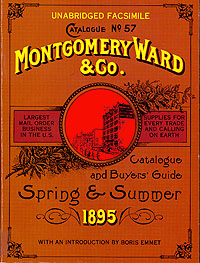
Look Inside!
